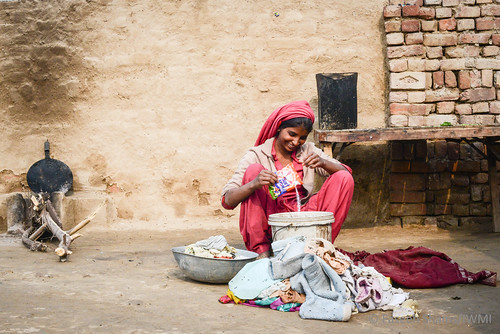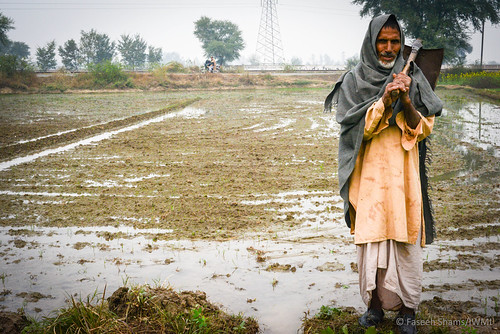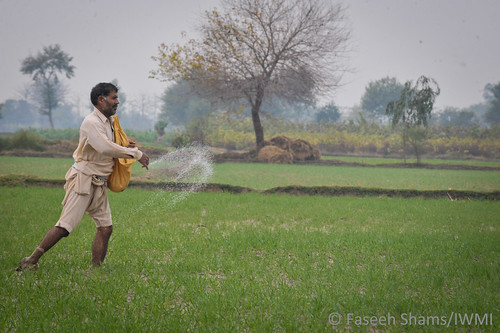Agriculture is the backbone of Pakistan’s economy, contributing
18.5% to its gross domestic product and employing 38.5% of the country’s labor force. Despite substantial investments, particularly in irrigation, land and water productivity is very low due to a number of factors. A massive 95% of freshwater is used for agriculture, and as much as
60% of this is lost due to inefficiency. Pakistan has the capacity to store rainwater for only 30 days during the three-month monsoon season, limiting the water supply needed for year-round irrigation. Groundwater is depleted at an alarming rate due to unsustainable use. Aging infrastructure, outdated technologies and a low level of coordination among government departments constrain efforts to establish modern agricultural systems. A major challenge is the lack of comprehensive and accurate information on the availability, storage, distribution and use of water resources at various scales.
Urbanization is taking place faster in Pakistan than anywhere else in South Asia, overloading already limited resources and services: only 20% of the population has access to safe drinking water and 40% does not have access to decent sanitation facilities. There is significant income and social inequity between men and women; the latter are mostly restricted to menial labor due to limits imposed by education and culture. Pakistan is extremely vulnerable to climate change. The country has faced catastrophic floods, droughts, cyclones and heat waves in recent years; these have killed or displaced thousands of people, destroying livelihoods and taking a heavy toll on the economy.
A systemic approach to natural resource management recognizes the complex relationships between hydropower generation, irrigated agriculture, water quality and environmental flows. IWMI champions this approach, which aims to balance farmers’ needs with those of energy consumers and water users. In Pakistan, we are spearheading innovative approaches to improve water-use efficiency at the farm and basin levels, supported by information gathered through remote sensing and decision support tools. Hydro-informatics and socioeconomic models help us to assess water resources management approaches and inform water policy.
In collaboration with the United States Agency for International Development (USAID), IWMI is supporting socioeconomic development and political stability in the northwestern province of Khyber Pakhtunkhwa. Completed in 2013, the Gomal Zam Dam aims to boost the incomes of an estimated 30,000 farming households through an irrigation scheme that provides irrigation water, flood control and hydroelectric power. While the scheme has substantially increased agricultural production, it has not met its full potential due to a lack of progress on governance and management. IWMI is working to reduce constraints to the productive and sustainable use of water in the Gomal Zam irrigation system. A key goal is to improve coordination between irrigation and agriculture departments and the federal Water and Power Development Authority (WAPDA). IWMI is also helping to build the capacity of these departments and farmers to construct water channels, ensure equitable water distribution, and measure flows and weather parameters; we also provide targeted training to improve water governance at all levels. IWMI particularly aims to engage women and youth in project activities. A number of activities around home gardens, gray water reuse, electric and diesel pumps, solar-powered pumps, basic nutrition and hygiene, livestock management, female literacy and education specifically target women.
A project funded by the Swiss Agency for Development and Cooperation (SDC) promotes the use of solar-powered pumps as an alternative to the unsustainable use of groundwater in irrigation. Solar-powered pumps are environmentally friendly, reliable and low maintenance. Once established, there are no operating costs. The government has already installed over 2,000 solar-powered pumps. However, this was done without giving much attention to sustainability or gender and equity concerns. The IWMI project emphasizes capacity building for using solar-powered pumps for the abstraction of groundwater, and the conjunctive use of groundwater and surface water, highlighting the use of water-efficient farming techniques. We are also studying the impact of solar irrigation on agriculture, energy, women and groundwater to support sustainable and socially-inclusive policies and approaches.
IWMI’s research on the impacts of climate change on water availability enables us to develop climate-smart interventions that improve the efficiency of agricultural water use across Pakistan. Our approach to climate change adaptation in the Indus Basin prioritizes the maintenance, restoration and sustainable use of ecosystems. The approach uses ‘nature-based’ solutions to support and manage naturally-occurring processes for cleaner and more reliable water supplies, for example, by enabling the underground storage of floodwater during the monsoon season to improve groundwater recharge. Supported by the CGIAR Research Program on Climate Change, Agriculture and Food Security (
CCAFS), IWMI has developed rapid emergency response maps based on high-resolution satellite images. The maps can locate vulnerable populations, and assess crop damage from floods, droughts and extreme rainfall. This provides valuable guidance to relief operations and post-flood impact assessments.
Efforts to find sustainable solutions to Pakistan’s water management challenges are hampered by the lack of reliable, evidence-based information on water availability and use. A good example is the interprovincial disputes over the shared waters of the Indus River. A major constraint has been the lack of accurate and reliable information on water flows of the canals and their distributaries between provinces. In 2004, WAPDA installed an electronic telemetry system to measure the depth of flow at various key locations along the Indus River. Unfortunately, the system was not approved by the Indus River System Authority or by provincial irrigation departments, due to serious reservations about data quality. Together with the
Pakistan Council of Research in Water Resources, IWMI is promoting dialogues and using state-of-the-art telemetry technology to measure water flows between provinces. We are exploring institutional arrangements and mechanisms for capturing water data and information, including a possible role for the private sector. A project funded by the Foreign, Commonwealth and Development Office (FCDO) builds the capacity of water institutions to enable flow measurement through training and technology transfer. A major goal is to build trust among the country’s water institutions, enhancing their engagement in resolving shared water issues. Involving stakeholders in every stage of the project has been critical to its success.

















